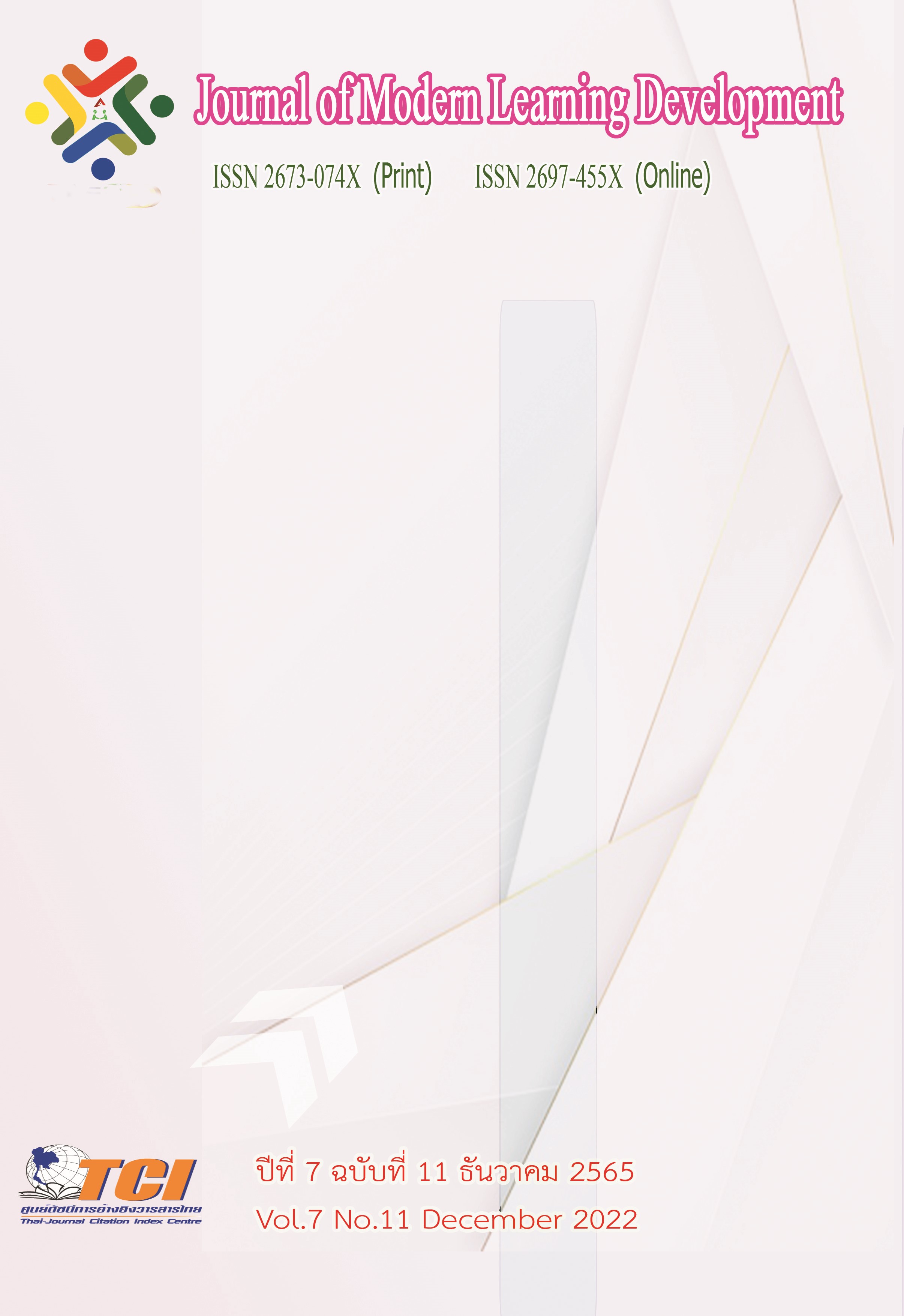การวิเคราะห์องค์ประกอบเชิงยืนยันปัจจัยที่มีผลต่อผลการดำเนินงานทางธุรกิจของอุตสาหกรรมอาหารเพื่อการส่งออกของประเทศไทย
Main Article Content
บทคัดย่อ
การวิจัยครั้งนี้มีวัตถุประสงค์ คือ 1) เพื่อพัฒนาองค์ประกอบของปัจจัยที่มีอิทธิพลต่อผลการดำเนินงานทางธุรกิจของอุตสาหกรรมอาหารเพื่อการส่งออกของประเทศไทย 2) เพื่อตรวจสอบความสอดคล้องระหว่างโมเดลองค์ประกอบเชิงยืนยันปัจจัยที่มีอิทธิพลต่อผลการดำเนินงานทางธุรกิจของอุตสาหกรรมอาหารเพื่อการส่งออกของประเทศไทยที่พัฒนาขึ้นกับข้อมูลเชิงประจักษ์ เป็นการวิจัยเชิงปริมาณ โดยใช้วิธีสุ่มแบบมีสัดส่วนในการสุ่มเลือกตัวอย่าง ประกอบด้วยผู้บริหารของบริษัทที่ประกอบอุตสาหกรรมอาหารเพื่อการส่งออกของประเทศไทย จำนวน 480 คน เครื่องมือสำหรับการวิจัย คือ แบบสอบถาม การวิเคราะห์ข้อมูลด้วยการวิเคราะห์องค์ประกอบเชิงยืนยัน สรุปผลการวิจัยพบว่า องค์ประกอบของปัจจัยที่มีผลต่อผลการดำเนินงานทางธุรกิจของอุตสาหกรรมอาหารเพื่อการส่งออกของประเทศไทย ได้แก่ (1) การบริหารคุณภาพทั่วทั้งองค์การ ประกอบด้วยตัวแปรสังเกตได้ 4 ตัวแปร ได้แก่ ความมุ่งมั่นของผู้บริหารสูงสุด การจัดการกระบวนการ การมีส่วนร่วมของพนักงาน และการให้ความสำคัญกับลูกค้า (2) ความรับผิดชอบต่อสังคมขององค์การ ประกอบด้วยตัวแปรสังเกตได้ 4 ตัวแปร ได้แก่ ความรับผิดชอบทางจริยธรรม ความรับผิดชอบต่อสิ่งแวดล้อม ความรับผิดชอบต่อพนักงาน และความรับผิดชอบต่อลูกค้า (3) ความสามารถทางการตลาด ประกอบด้วยตัวแปรสังเกตได้ 4 ตัวแปร ได้แก่ ความสามารถด้านพัฒนาผลิตภัณฑ์ ความสามารถด้านราคา ความสามารถด้านช่องทางจำหน่าย และความสามารถทางการสื่อสาร (4) ความสามารถเชิงพลวัต ประกอบด้วยตัวแปรสังเกตได้ 4 ตัวแปร ได้แก่ ความสามารถเห็นโอกาส ความสามารถในการดูดซับความรู้ ความสามารถในการปรับตัว และความสามารถในการประสานงาน (5) นวัตกรรมขององค์การ ประกอบด้วยตัวแปรสังเกตได้ 4 ตัวแปร ได้แก่ นวัตกรรมการจัดการ นวัตกรรมการตลาด นวัตกรรมกระบวนการ และนวัตกรรมผลิตภัณฑ์ และโมเดลองค์ประกอบเชิงยืนยันแต่ละโมเดลมีความสอดคล้องกับข้อมูลเชิงประจักษ์
Article Details
เอกสารอ้างอิง
ปรารถนา หลีกภัย.(2557). ปัจจัยที่มีผลต่อความสามารถทางนวัตกรรมของธุรกิจโรงแรมในกลุ่มจังหวัดภาคใต้ชายแดนของประเทศไทย.วารสารการจัดการสมัยใหม่. 12 (1), 11-21.
ศูนย์อัจฉริยะอาหารเพื่อการส่งออก (2563). มูลค่าการส่งอออกอาหารไทยระหว่างปี พ.ศ. 2556-2563. ออนไลน์. สืบค้นเมื่อ 17 กุมภาพันธ์ 2565. แหล่งที่มา : http://fic.nfi.or.th/index.php
สุภมาส อังศุโชติ, สมถวิล วิจิตรวรรณา และรัชนีกูล ภิญโญภานุวัฒน์. (2557). สถิติวิเคราะห์สำหรับการวิจัย ทางสังคมศาสตร์และพฤติกรรมศาสตร์: เทคนิคการใช้โปรแกรม LISREL. (พิมพ์ครั้งที่ 4). กรุงเทพมหานคร: เจริญดีมั่นคงการพิมพ์.
Adeyemo, S. A., F. F. Oyebamiji, and K. O. Alimi. (2013). An evaluation of factors influencing
corporate social Responsibility in Nigerian manufacturing companies. International Journal of Academic Research in Economics and Management Sciences. 2 (6), 54-63.
Alosani, M.S., Yusoff, R., & Al-Dhaafri, H. (2020). The effect of innovation and strategic planning on enhancing organizational performance of Dubai police. Innovation and Management Review. 17 (1), 2-24.
Best, J.W.,& Kahn, J.V. (2014). Research in Education. (10th Ed.). Harlow England: Pearson
Education.
Eisinga,R., Te Grotenhuis, M., & Pelzer, B. (2012). The reliability of a two-item scale: Pearson, Cronbach or Spearman-Brown. International Journal of Public Health. 58 (4), 637-642.
Hair, J. F., Black, W. C., Babin, B. J. & Anderson, R. E. (2010). Multivariate data analysis (7th ed.). New Jersey: Pearson Education.
Jean, R.-J., & Kim, D. (2020). Internet and SMEs' internationalization: The role of platform and website. Journal of International Management, 26(1), e100690.
Kayabasi, A., & Mtetwa, T. (2016). Impact of marketing effectiveness and capabilities, and export market orientation on export performance: Evidence from Turkey. European Business Review. 28 (5), 532-559.
Kaleka, A. & Morgan, N.A. (2019). How marketing capabilities and current performance drive strategic intentions in international markets. Industrial Marketing Management, 78, 108-121.
Kohnke, L., Zhang, R., & Zou, D. (2020). Using mobile vocabulary learning apps as aids to knowledge retention: Business vocabulary acquisition. Journal of Asia TEFL, 16(2), 683-690.
Mohammed, A. & Rashid, B. (2018). A conceptual model of corporate social responsibility dimensions, brand image, and customer satisfaction in Malaysian hotel industry. Kasetsart Journal of Social Sciences, 39, 358-364
Munizu,M (2013).The Impact of Total Quality Management Practices towards competitive advantage and organizational performance: Case of fishery industry In South Sulawesi Province of Indonesia. Pakistan Journal of Commerce and Social Sciences. 7 (1), 184-197.
Patyal,V.S., Ambekar, S. & Prakash, A. (2020).Organizational culture and total quality management practices in Indian construction industry. International Journal of Productivity and Performance Management. 69 (5), 895-913.
Pérez, A., & Bosque,I. R.D. (2016). The stakeholder management theory of CSR: A multidimensional approach in understanding customer identification and satisfaction.
International Journal of Bank Marketing. 34(5), 731-751
Rigby, D. and B. Bilodeau. (2015). Management Tools & Trends 2015. (Online). http://www.bain.com/publications/articles/management-tools-and-trends- 2015.aspx
Ronna CT. & Laurie C. (2003). Indexes of item-objective congruence for multidimensional items. International Journal of Testing. 3 (2), 163-171.
Sharma, S. & Modgil, S. (2020).TQM, SCM and operational performance: an empirical study of Indian pharmaceutical industry. Business Process Management Journal, (1),331-370.
Torres, R., Sidorova, A., & Jones, M.C. (2018). Enabling firm performance through business intelligence and analytics: A dynamic capabilities perspective, Information and Management. 55 (7), 822-839.
Wilden, R. & Gudergan, S. (2015). The impact of dynamic capabilities on operational marketing and technological capabilities: Investigating the role of environmental turbulence. Journal of the Academy of Marketing Science. 43 (2), 181-199.
Yi, H-T., Han, C-N., & Chan, Y-B. (2018). The effect of entrepreneurship of SMEs on corporate capabilities, dynamic capability and technical performances in South Korea. Journal of Asian Finance, Economics and Business. 5 (4), 135-147.


